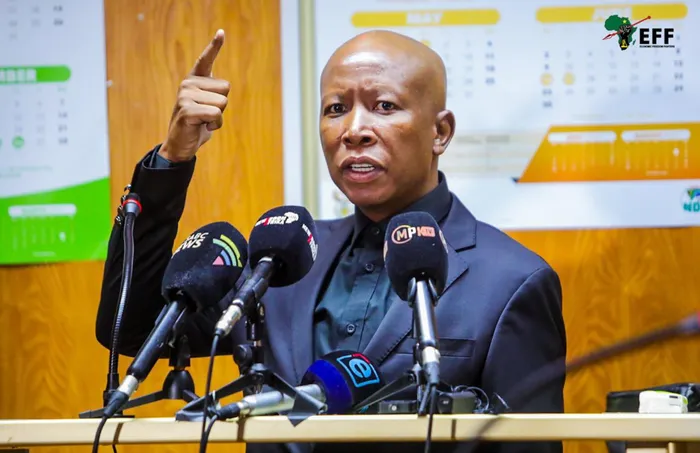The United Kingdom has decided to deny an entry visa to Julius Malema, the leader of South Africa’s Economic Freedom Fighters (EFF), based on concerns relating to public safety. This decision follows allegations circulating within the United States, which suggest that white individuals in South Africa are facing persecution, a claim that Malema has come under scrutiny for endorsing. The UK visa office highlighted that allowing Malema to enter the country would not serve the public good, particularly due to his outspoken support for Hamas, the armed group that the UK has designated as terrorist. This stance aligns with broader international concerns regarding statements made by Malema that promote violence and racial division, reflecting a troubling trend in his political rhetoric that has consistently sparked controversy both domestically and abroad.
In their correspondence regarding the visa denial, the UK Home Office elaborated that Malema’s past declarations advocating for supporting Hamas and his refusal to distance himself from aggressive racial statements in South Africa raised significant alarms. Specifically, the Home Office referenced his appearance at a South African court in 2022, where he declined to renounce calls for violence against white individuals. Moreover, Malema’s provocative remarks in a video shown by former President Donald Trump that included chants to “cut the throat of whiteness” showcased his extreme views, leading the UK officials to categorize him as a potential threat to public safety. Ultimately, the rejection of his visa underscores the delicate balance governments must maintain concerning immigration and public security, especially when it comes to figures known for incendiary political messages.
Historically, the EFF, under Malema’s leadership, has risen to prominence within South Africa’s political landscape, advocating for radical reforms like land redistribution and the nationalization of key sectors. However, despite this initial popularity, the party has faced challenges, notably suffering a decline in electoral support during the last elections, where it garnered only 9.5 percent of the vote. The party’s fiery rhetoric and populist approach may have begun to alienate a portion of the electorate, as evidenced by their reduced traction in the political arena. This decline, coupled with Malema’s latest public backlash, including his visa refusal by the UK, paints a complicated picture of a politician who had previously captured attention through bold promises and confrontational tactics, but is now confronted with the tangible consequences of his extreme ideologies.
UK Visa Rejection for Julius Malema
The United Kingdom has denied an entry visa to Julius Malema, the leader of the Economic Freedom Fighters (EFF), citing concerns over public safety. The visa office stated that Malema’s presence would not be conducive to the public good. This decision was influenced by his alleged support for Hamas, an organization classified as a terrorist group in the UK.
In their official communication, the UK Home Office emphasized that Julius Malema’s advocacy for arming Hamas played a significant role in the visa denial. They noted that he had previously failed to disavow statements encouraging violence towards white South Africans. A representative of the Home Office remarked, “Your presence in the UK has been assessed as non-conducive to the public good based on your conduct and associations.”
Malema’s political career has been marked by controversial statements, including those perceived as inciting violence. His party, the EFF, gained attention for its radical approaches to land reform and economic policies; however, these same statements have drawn ire both locally and internationally. Recently, his comments have been framed within the broader context of allegations around ‘white genocide’ in South Africa, which the UK government deems inflammatory.
Malema’s Impact and Political Landscape
As the figurehead of the EFF, Julius Malema has maintained a polarizing presence in South African politics, notably with a Marxist and anti-capitalist stance. His party has made a name for itself by pushing for significant changes in land ownership and economic equity. Despite their notable presence, the EFF secured only 9.5% of the votes in the last national election, indicating a decline in support.
The EFF’s growing unpopularity comes amidst increasing scrutiny of Malema’s rhetoric, which has drawn criticism for its aggressive tone. This has culminated in his designation as undesirable for entry into the UK. Critics argue that his inflammatory language threatens social cohesion, while supporters believe it addresses historical injustices. Malema’s decline reflects a challenging political landscape for his party, navigating between radical promises and electoral realities.
Thus far, Malema’s international engagements have been minimal, primarily due to statements that resonate poorly with foreign governments. The incident highlights not only the complexities of his political strategies but also the broader implications for South Africa’s reputation abroad. As noted by a political analyst, “Malema’s voice carries weight, but with that comes greater scrutiny, especially when it touches on global peace and security issues.”
Summary
The UK has denied a visa to Julius Malema, leader of the Economic Freedom Fighters (EFF), due to concerns regarding public safety stemming from his controversial support for Hamas and inflammatory statements regarding racial violence in South Africa. The UK visa office deemed that Malema’s presence would not be conducive to the public good, particularly referencing his advocacy for arming Hamas and alarming rhetoric such as calls for violence against white South Africans, which he had previously refrained from condemning in court. Malema’s political party, known for its radical, anti-capitalist stance and calls for land redistribution, has seen a decline in popularity, finishing fourth in the last elections. The decision highlights the ongoing tension surrounding claims of racial persecution in South Africa and the delicate nature of Malema’s political activism on the international stage.



More Stories
Siv Ngesi Responds to Piers Morgan’s South African Joke
Kgomotso Meso Nominated for Radio Presenter of the Year
Nelisiwe Sibiya: Overcoming Villain Role Challenges